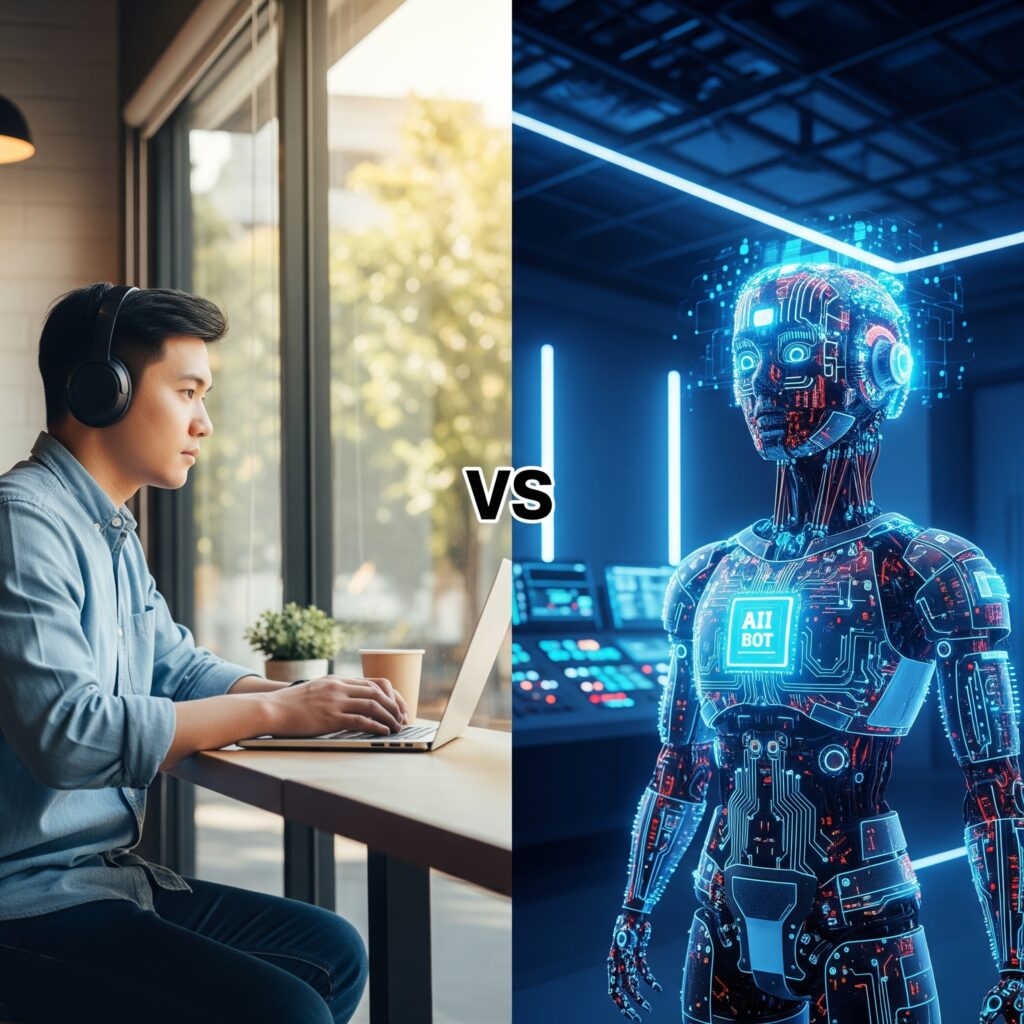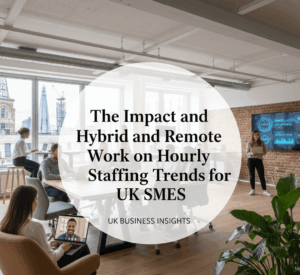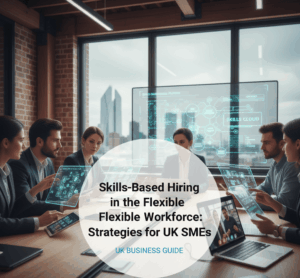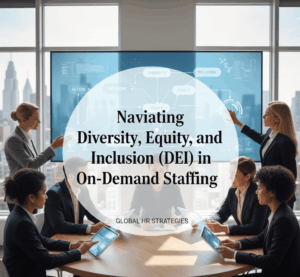
Global Talent Orchestration and Time Zone Advantages for UK Businesses
Global Talent Orchestration and Time Zone Advantages for UK Businesses Get in Touch Did you know that UK businesses leveraging global virtual assistants across time
In 2025, artificial intelligence (AI) in recruitment stands as a game-changer for UK small and medium-sized enterprises (SMEs), with adoption rates soaring to 48% among recruitment agencies and 20% of SMEs deploying applicant tracking systems (ATS) for CV screening. This boom promises to slash time-to-hire by up to 40% and recruitment costs by 30% per hire, freeing cash-strapped teams to focus on core operations. Yet, as AI handles the grunt work, its blind spots in assessing empathy, creativity, and ethical nuances leave many SMEs grappling with incomplete hires. This guide demystifies AI versus human hiring, spotlighting why a hybrid approach, exemplified by StaffNow’s expert-led vetting, empowers SMEs to secure talent that aligns with business culture and long-term vision, ensuring ethical, efficient recruitment that ranks for success.
Artificial intelligence has swept through UK hiring like a digital revolution, with 30% of employers now integrating AI tools, up from a mere 10% in 2022. By mid-2025, over 65% of global recruiters and a growing slice of UK firms have adopted AI to streamline processes, driven by its knack for boosting efficiency by 66% in talent acquisition. For SMEs, where HR budgets are tight, AI’s appeal shines: it automates sourcing, slashing administrative hours by 4.5 weekly and cutting costs by 71% per role.
Key drivers include predictive analytics for talent forecasting and bias-reducing algorithms that promote fairer shortlisting. A 2025 SSR study highlights 70% of large UK enterprises using ATS, with SMEs at 20% yet 48% of smaller firms cite no plans, often due to integration fears. Despite this, 87% of companies worldwide now use AI-driven tools, with UK SMEs poised to follow as tools become more affordable and user-friendly. The catch? Only 1% of managers let AI finalise decisions, underscoring the vital role of human oversight in this hybrid era.
For resource-limited SMEs, AI is less a luxury and more a lifeline, automating the tedious to amplify impact. Start with job ad creation: Tools like generative AI craft tailored postings in seconds, incorporating SEO keywords for wider reach on platforms like LinkedIn.
Next, CV screening via ATS parses thousands of applications, ranking candidates by skills match, ideal for high-volume roles in retail or tech startups. Initial interviews? AI chatbots handle 24/7 scheduling and basic Q&A, reducing no-shows by 45%. Predictive hiring analytics forecast cultural fit from data patterns, while onboarding bots personalise welcomes, cutting admin by 40%.
Yet, for SMEs, success hinges on selecting accessible tools like free tiers of ChatGPT for drafting or affordable ATS from Reed, always paired with human review to catch AI’s occasional over-reliance on data over diversity.
AI excels at scale, but it falters where humanity thrives: 67% of applicants doubt its grasp on nuanced skills like empathy or innovation, a sentiment echoed in 2025 surveys. Human recruiters shine in ethical judgment, probing motivations during interviews to ensure cultural alignment, crucial for SMEs where one bad hire can derail teams.
Consider soft skills: AI scores resumes on keywords, missing the creative spark or ethical compass vital for leadership roles. A 2025 Pew study reveals 47% trust AI for equal evaluation but only 15% for nuanced assessments, highlighting its limits in diversity and inclusion. Moreover, legal pitfalls loom; without human oversight, AI risks amplifying biases, breaching UK Equality Act standards.
In essence, while AI handles volume, humans ensure hires that build loyal, innovative cultures.

At StaffNow, we bridge the AI-human divide with a human-led vetting process that boasts an 18% acceptance rate, rigorously testing for soft skills AI often skips. Our experts conduct skills trials, background checks, and proficiency assessments, complementing AI’s efficiency with depth , delivering candidates 14% more likely to succeed in interviews post-AI screening.
This model surpasses standalone AI by integrating ethical reviews, ensuring compliance with GOV.UK’s Responsible AI guidelines for recruitment. SMEs gain access to pre-vetted talent for complex roles, blending tech speed with human reliability for outcomes that outpace competitors.
AI suits routine hires, but pivot to humans for high-stakes roles. Opt for StaffNow’s experts when:
In 2025, 52% of SMEs report better engagement via human-led processes for these, avoiding AI’s 66% applicant deterrence rate. Human choice safeguards against pitfalls like over-automation, preserving your SME’s unique voice.
The 2025 blueprint for SME success? A hybrid model fusing AI’s velocity with human wisdom. Start by auditing needs: Use AI for initial sourcing (saving 67% time), then layer human vetting for finals. Follow GOV.UK best practices: Conduct impact assessments pre-deployment, ensure transparency in AI use, and maintain feedback loops for continuous refinement.
This synergy, as StaffNow exemplifies, positions UK SMEs to thrive, turning recruitment into a competitive edge.
As 2025 unfolds, AI’s role in UK SME recruitment is undeniable, automating 40% of tasks and enhancing efficiency for 66% of users, yet its limitations in human-centric judgment demand balance. By weaving in human expertise for ethics, creativity, and fit, SMEs avoid costly mis-hires and foster inclusive teams. StaffNow’s vetted professionals exemplify this hybrid prowess, delivering talent that propels growth while upholding standards.
Unlock the hybrid advantage: Partner with StaffNow for vetted experts who amplify AI’s strengths. Schedule a free consultation today and transform your recruitment, smarter, faster, human at heart. Visit staffnow.uk or email [email protected] to get started.
Curious about navigating AI and human hiring for your SME? Below, we address common queries with insights drawn from 2025 trends, helping you make informed decisions.
Affordable options like LinkedIn’s AI recruiter or free ATS from Indeed excel at sourcing, while tools like HireVue offer bias-checked interviews. Always pair with human review for best results.
AI evaluates on objective data, potentially cutting subjective errors, but requires diverse training sets; humans add the ethical lens to ensure true equity.
Absolutely: It trims costs by 30% via automation while boosting hire quality, yielding ROI through faster onboarding and higher retention.
Under the Equality Act and GDPR, conduct impact assessments and disclose AI use. GOV.UK guidelines stress transparency to avoid discrimination claims.
Our human vetting seamlessly complements ATS or chatbots, providing pre-qualified candidates ready for your process. Enquire for a custom demo.

Global Talent Orchestration and Time Zone Advantages for UK Businesses Get in Touch Did you know that UK businesses leveraging global virtual assistants across time

How a Virtual Assistant Can Transform Your Small Business in the UK in 2026 Get in Touch Did you know that subscription-based virtual assistant models

Get in Touch The Impact of Hybrid and Remote Work on Hourly Staffing Trends for UK SMEs Did you know that in 2025, 74% of

Get in Touch Skills-Based Hiring in the Flexible Workforce: Strategies for UK SMEs Did you know that 90% of UK SMEs are grappling with skills

Get in Touch Should You Hire a Virtual Personal Assistant or Build an AI Agent? Pros and Cons Did you know that UK SMEs with

Get in Touch Ethical AI in Recruitment: Mitigating Bias in Candidate Matching Did you know that by 2025, 70% of HR departments are predicted to